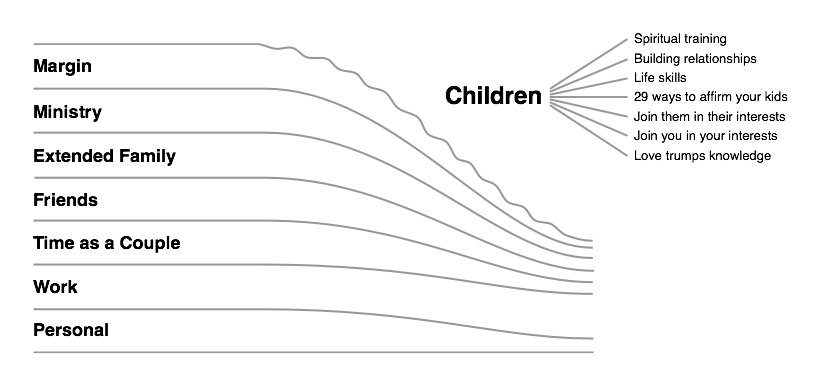The first investment on our chart regarding our kids is spiritual training. For our family, this started with reading the Bible and praying together. When our children were young, we usually read a Bible story at bedtime. Over the years, our Bible reading and prayer time varied from around the dinner table to early evening to early morning before Dad went to work. The important part was not the when or how, but the consistency; making the time for family worship in our busy schedules.
The consistency your kids see in your effort elevates God’s Word in their minds. They see that this connecting to God through our praise, His Word, and prayer is important enough to Mom and Dad to make it a priority. Besides sticking with the plan, there are also important considerations for making the time interesting and inviting to your kids.
One of the best ways to keep our kids connected to the goal is through variety. We not only varied the times of day over the years, but varied the approach to make things age-appropriate. As I mentioned, we started small with Bible story books like The Bible in Pictures for Little Eyes. In the early elementary years we graduated to Leading Little Ones to God, an excellent book for explaining big topics about God in ways that children can understand. These are just two we used. There are many other great resources out there.
Eventually we reached a point where we read through the entire Bible in one year. If you are wondering how we made it though all 1189 chapters of the Bible with five kids in tow in such a short time, I will let you in on a little secret (just don’t tell anyone else…shhh), “we did not read every word”. I know that this a difficult concept for you 100 percenters to grasp, but it is OK. In fact, I think it is the preferred approach when working with kids.
We found a reading plan in one of our kids The New Student Bible (NIV) that included 190 chapters of the Bible. These chapters, at least one from every book of the Bible, taken together provided a grand picture of the over-arching story of God’s Word. It was a great way to get our kids into the main ideas of Scripture without getting lost in details that could be fit into the picture when they were older.
As we took turns reading each chapter, one of the kids would take notes on the main points in the chapter, and record those in our big red notebook. At the end of each chapter’s reading, we would choose a key to the chapter; a five to ten word phrase that summarized the Scripture passage. This became an additional learning tool as the kids paid close attention to the reading so they could contribute to the key.
Let me emphasize, there is a huge difference between entertaining kids and making things interesting. The former is unnecessary and only detracts from the goal. We always stayed focused on the Bible and its message. But we were highly motivated on the latter; making things interesting. When we acknowledge and work with the differences in our kids ages and learning styles and personalities, we are willing to do the work to make our family devotions a point of unity and connection not a drudgery. In too many situations where very little thought is put into the effort, we see kids experience, “You will know the truth and the truth will make you bored.”
Please hear me, this is not about wham bam entertaining. This is simply paying attention to how best to connect your family to what God wants to teach us through His Word and our prayers. And one of the best ways to enhance our teaching is to build a relationship with your child. That will be our topic next time.

 We have already acknowledged that our new responsibility of children will squeeze our other priorities. But what do we do with the time we dedicate to our kids? One thing I emphasize with fathers is that this time with our children is not babysitting or childcare. It is investing. It is investing in their future and our legacy.
We have already acknowledged that our new responsibility of children will squeeze our other priorities. But what do we do with the time we dedicate to our kids? One thing I emphasize with fathers is that this time with our children is not babysitting or childcare. It is investing. It is investing in their future and our legacy.